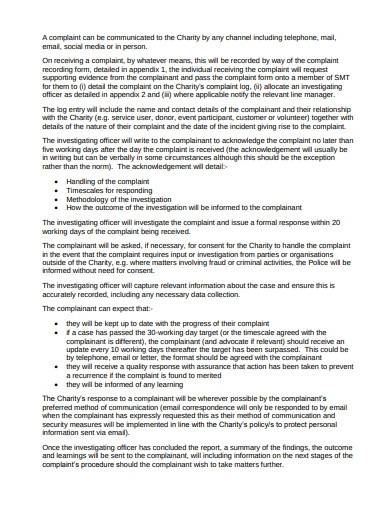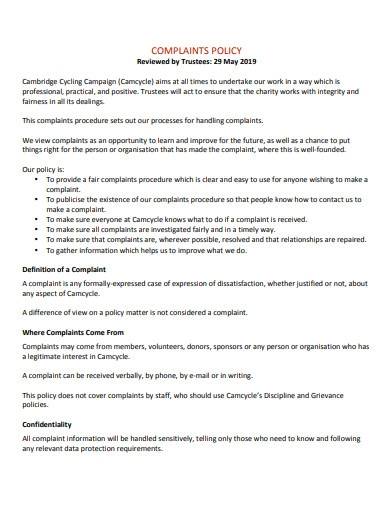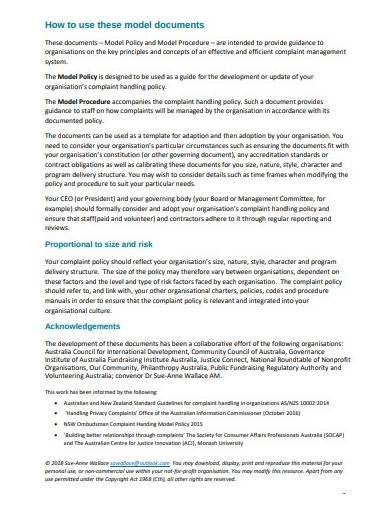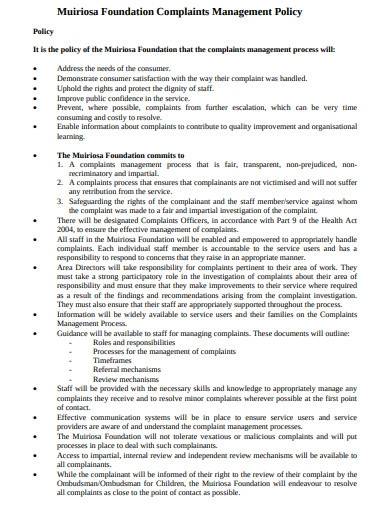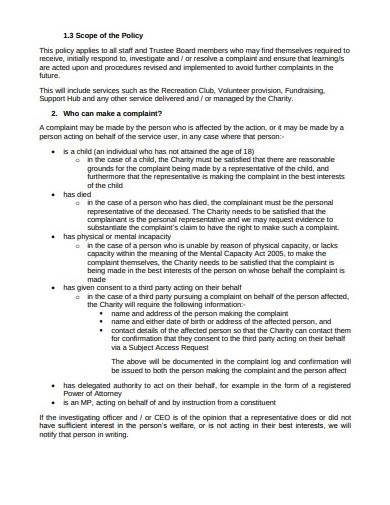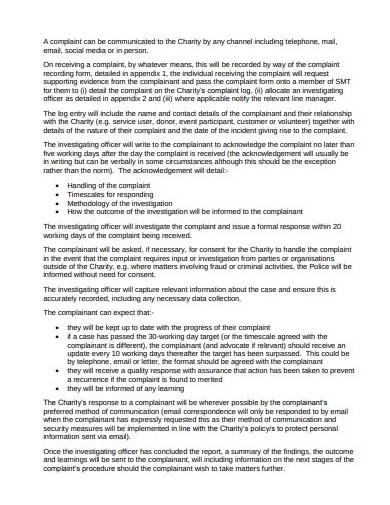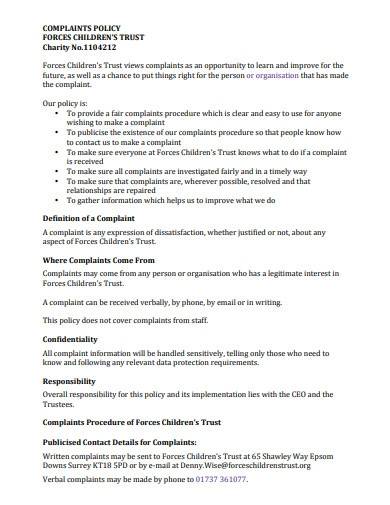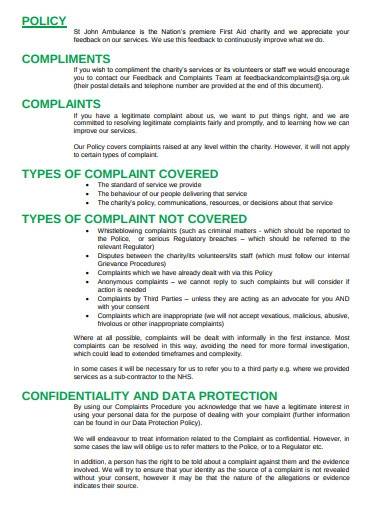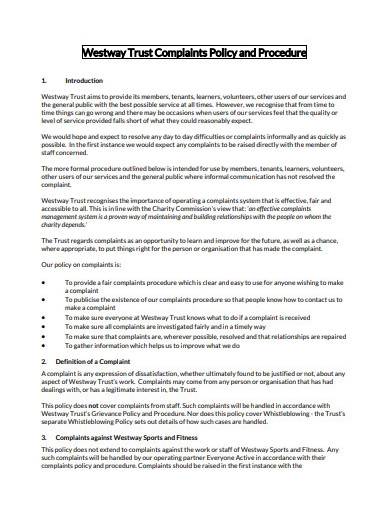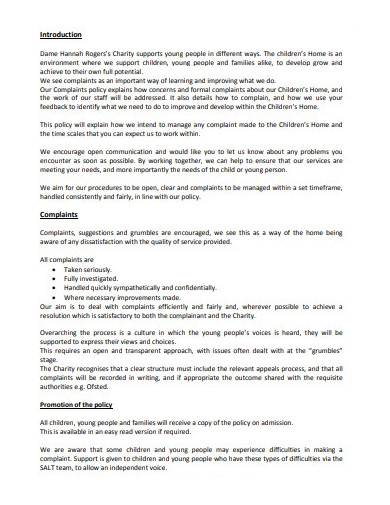Policies are meant to be followed no matter where you are or what organization you belong. Having the right policies in place helps in the establishment of uniform and organized processes. Polices are design to help make an organization make improvements or changes on how they do things. One such policy is a charity complaints procedure policy. We don’t always come across policies of charitable organizations, but we do know of complaints procedure policies. Here, we will find out why a charitable organization needs a complaints policy and who would make a complaint to them.
FREE 10+ Charity Complaints Procedure Policy Samples & Templates in PDF
1. Charity Complaints Procedure Policy Template
2. Trustee’s Complaints Procedure Policy Template
3. Charities Complaint Handling Procedure Policy
4. Foundation Management Complaints Policy Template
5. Charity Complaints Procedures & Policy
6. Formal Charity Complaints Procedure Policy
7. Children’s Trust Complaints Procedure Policy
8. Charity Feedback Complaints Procedure Policy
9. Sample Trust Complaints Policy and Procedure
10. Orphan’s Home Complaints Procedure Template
11. Basic Charity Complaints Procedure Policy
What Is a Charity Complaints Procedure Policy?
A complaint is made when something is done unsatisfactory or unacceptable. We often hear complaints about customer service, on the management of an establishment, on office management, etc. There is actually a lot to complain about. Charitable organizations are not exempted from getting complaints. It just makes you wonder who would actually complain to them? Charitable organizations are not perfect; that is why they also receive their share of complaints from people who are not satisfied with some aspects of the organization. Complaints against the organization must be handled appropriately; that is why they need a complaint handling procedure to take care of the situation when it arises, called a charity complaints procedure policy.
The aim of a charity complaints procedure policy is to make sure that all complaints against the organization are handled promptly. Through the policy document, the problem or issue is corrected. It also helps in making improvements in the services provided by the organization by realizing what went wrong and making up for it in the proper way. Making a formal complaint becomes easy with a charity complaints procedure policy because it will guide the complaining party on how to properly make the complaint so that their sentiments and dissatisfaction can be heard.
How to Make a Charity Complaints Procedure Policy
A charitable organization is responsible for making a charity complaints procedure policy that is applicable to their organization. This is so that they can handle reasonably and sensitively handle the complaint and take immediate action. Here are steps on how to make a simple charity complaints procedure policy.
1. Make an Outline
Include all the parts or sections of the complaints procedure policy. Making an outline as a first step allows you to list down all the necessary ingredients to your policy. Deciding on what to write next is also easy with the outline as a guide. There are blank outline templates online that you can download and use for free.
2. Compose the Introduction, Purpose, and Definition
These sections should have clear and concise statements that your readers can understand. It should not be made to confuse your readers. The introduction should provide a summary or brief overview of the organization, including its vision and mission. Write the purpose and definition separately.
3. Provide Categories for Complaint
Complaints can be of different nature, and providing compliant categories will make it easier to file the complaint. At the same time, it allows you to appropriately deal with different complaints in a timely fashion. It also allows complaints to be subdivided into smaller units and assigned to different teams for a resolution.
4. Write the Steps
The steps here refers to the steps to file a complaint. Simple steps are enough to make a reliable complaint procedure for the organization. Writing clearly and using simple terms will make th steps understandable and easy to follow. You can check out samples and templates to help you make the appropriate steps for a complaints procedure policy.
FAQs
What are the benefits of a charity complaint procedure policy?
A charity complaint procedure policy will help in reducing costs that are brought about by handling complaints. If the appropriate steps for handling a complaint are available, the staff can follow those steps and fix the issue before it gets out of hand. It also helps the organization have better risk management and potentially reduce the number of complaints. The complaint procedure can also promote best practices, better outcomes, and better quality assurance.
What details are recorded in a complaint?
The details that must be included in a complaint include the date when the complaint was made, the people involved in the complaint, a brief description of the problem, how the staff responded to the complaint, the actions taken to resolve the problem, who handled the complaint, and the date when the complainant was informed of the outcome of the complaint.
What are the responsibilities of a complainant?
A complainant is the entity who filed a complaint. Their responsibilities include bringing the complaint to the organization’s attention through writing and other possible means, raise concerns promptly, describe the problem as clearly and as detailed as possible, allow the organization time to find a solution, and be aware that some circumstances may be out of the organization’s control
Not all complaints are bad. Often, these complaints allow both people and organizations to grow and become better versions of themselves. It helps them realize what they did wrong and work harder to change bad ways. The important thing is learning from mistakes as they are pointed out in the complaints.
Related Posts
FREE 10+ Charity Mission Statement Samples and Templates in MS Word | PDF
FREE 10+ Charity Pay Policy Samples & Templates in MS Word | PDF
FREE 5+ Charity Investment Policy Samples & Templates in MS Word | PDF
FREE 10+ Charity Privacy Policy Samples & Templates in MS Word | PDF
FREE 10+ Charity Standing Order Form Samples & Templates in MS Word | PDF | MS Excel
FREE 10+ Charity Risk Management Policy Samples & Templates in PDF
FREE 3+ Charity Investment Strategy Samples & Templates in PDF | MS Word
FREE 5+ Charity Marketing Policy Samples & Templates in PDF
FREE 5+ Charity Recruitment Policy Samples & Templates in MS Word | PDF
FREE 3+ Charity Management Accounts Samples & Templates in PDF
FREE 10+ Charity Gift Aid Form Samples & Templates in MS Word | PDF
FREE 10+ Charity Strategy Samples & Templates in MS Word | PDF
FREE 6+ Charity Marketing Strategy Samples & Templates in MS Word | PDF
FREE 10+ Charity Financial Policy Samples & Templates in MS Word | PDF
FREE 10+ Charity Financial Policies and Procedures Samples & Templates in MS Word | PDF

